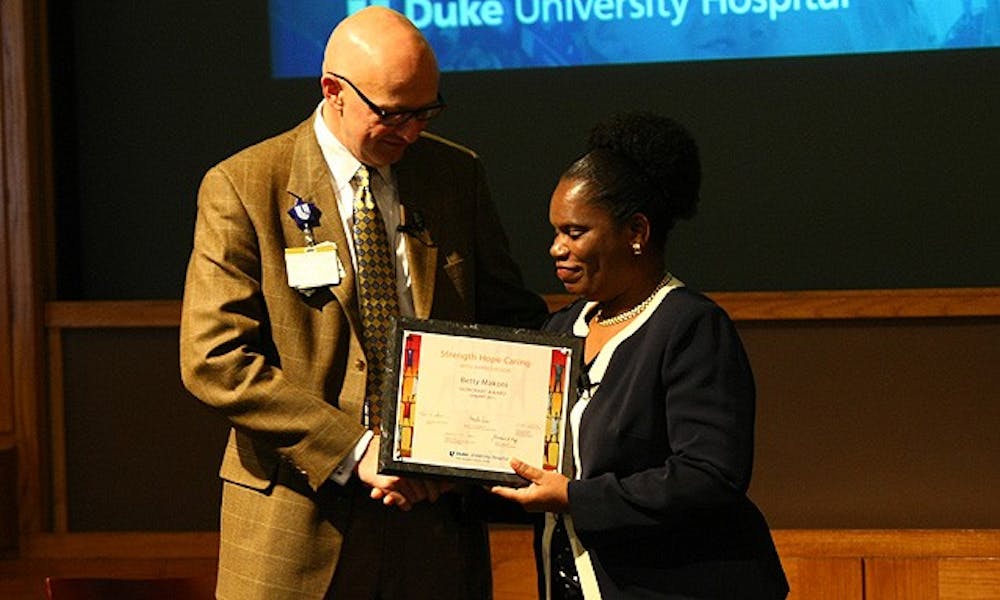Betty Makoni was raped at age six, a tragedy not uncommon in her native Zimbabwe. As an adult, she has worked against such injustices and has rescued more than 35,000 girls and women since 1999.
About 150 Duke Medicine employees braved the snow Tuesday afternoon to see Makoni speak as part of the 2011 Dr. Martin Luther King Jr. Commemoration hosted by Duke Medicine. Makoni, who founded the Girl Child Network Worldwide and four girls empowerment villages in Zimbabwe, is a gender activist and has committed her life to supporting women.
President of the Duke University Hospital Kevin Sowers said that Makoni—who was named one of the Top 10 CNN Heroes of 2009—was brought to campus because, like King, she demonstrates commitment to making a difference in her community.
“She truly exemplifies the beliefs of Dr. King,” said Sowers, who joined Makoni on the stage for the conversation.
Makoni agreed their goals are similar, noting that, like King, she uses nonviolent means to combat inequality.
“He fought against inequality of race, we fight against the wall of gender,” she said. “In every part of the world, the basic unit is a family—if the father is raping the daughter, there is no way the world can move forward.”
Makoni’s struggle against gender inequality began after she started teaching in Zimbabwe. She quickly noticed that most of her female students were dropping out and that the cause was the widespread rape of the young girls. The majority of these rapes was a consequence of the “virgin myth,” a widespread legend in Zimbabwe according to which the rape of a virgin will cure a man’s HIV. The myth has led to the rape of thousands of women, young girls and infants throughout Zimbabwe.
“The classroom became too small for me,” she said. “I found myself an activist.”
Makoni went on to found all-female girls empowerment villages to help rehabilitate and educate raped girls. She said part of the process is teaching girls to differentiate “between good men and bad men.”
She also fights patriarchy psychologically, reclaiming symbols traditionally exclusive to boys and men. To demonstrate this, Makoni showed the audience a photo of the girls in one of her empowerment camps—they were all dressed in blue.
“We took the boys’ color by force,” Makoni said, making the audience laugh.
To students of both genders, Makoni recommended forming girls clubs to empower women around the world.
“You don’t have to be in Africa, it’s about all of you mobilizing,” Makoni said in an interview before her speech. “Let’s see men coming to Facebook to say look, Betty, you are not alone.”
Celestine Buie, an administrative assistant at Duke Medicine, described Makoni’s conversation with Sowers as life-changing.
“You never know what people have gone through,” Buie said. “It’s unbelievable that she is a survivor after all she’s gone through and that she’s trying to pull others out of it. I wish more people could have come to know who she is, to know that Duke saw the need to bring her here.”
Get The Chronicle straight to your inbox
Signup for our weekly newsletter. Cancel at any time.

